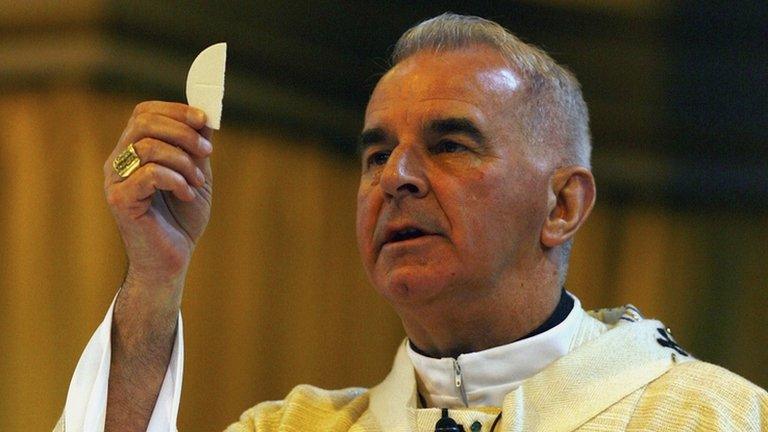Cardinal Keith O'Brien: A man of conviction and controversy
- Published
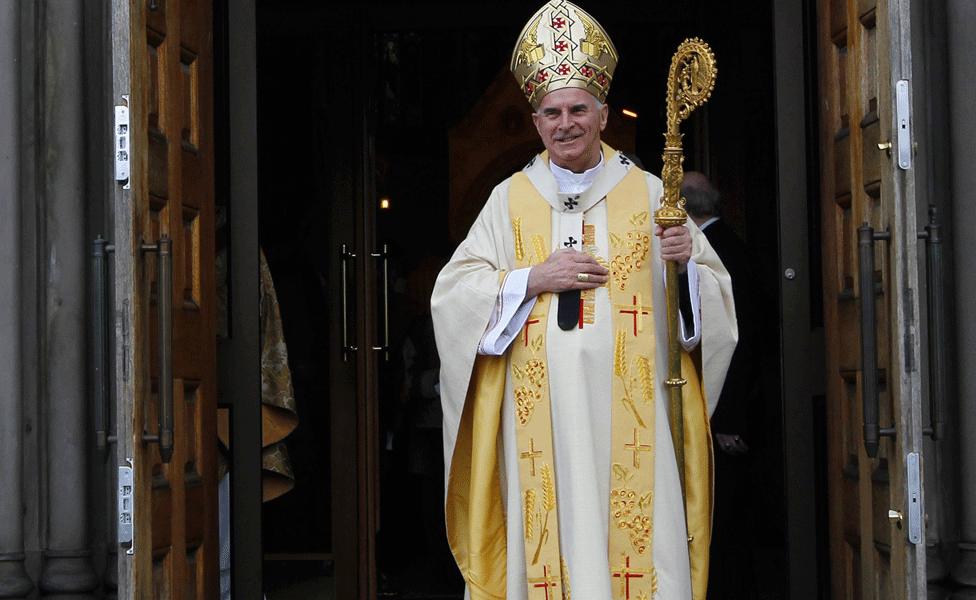
Keith O'Brien was Archbishop of Saint Andrews and Edinburgh and a Catholic cardinal
Cardinal Keith O'Brien - at one time the Catholic Church's most senior cleric in Britain - has died aged 80. He stepped down from the public role in 2013 after three priests and a former priest made allegations against him.

Saints' days matter to Catholics, so the symbolism of one of their own being born on St Patrick's Day and dying on the feast of St Joseph is important.
It was on March 17, 1938, that Keith Michael Patrick O'Brien came into the world in the small coastal town of Ballycastle, County Antrim, Northern Ireland.
He died, two days after turning 80, on 19 March in the Royal Victoria Hospital, Newcastle.
The cardinal ended his life in the north of England city, far away from the Catholic Church's trappings of high office in Edinburgh.
Five years ago, when he stepped away from his very public role as one of Britain's most senior clergymen he did so as a repentant sinner.
'For failures, I apologise'
Claims that he had made inappropriate advances to three priests and a former priest had surfaced in the months preceding his departure.
The media spotlight on Cardinal O'Brien was unwelcome because the world's Catholic cardinals were due to gather in Rome to elect a successor to Pope Benedict.
A decision needed to be made and the path the cardinal chose was to go.
In his resignation statement there was just an oblique reference to the allegations made against him: "For any good I have been able to do, I thank God. For any failures, I apologise to all whom I have offended."
He then left and spoke publicly no more.
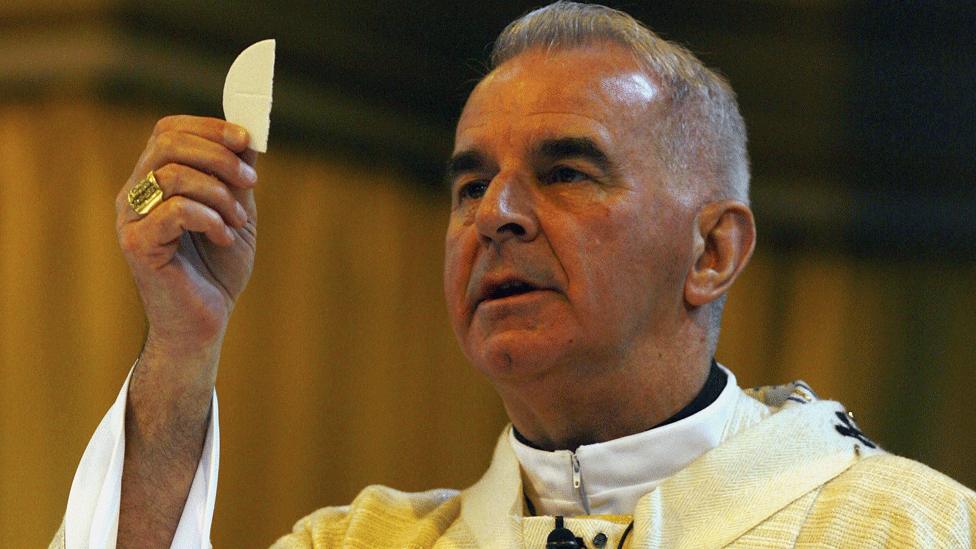
Cardinal Keith O'Brien studied to become a priest and was ordained at the age of 26
However, in office his voice was strong and uncompromising.
He sparked controversy when he locked horns with the Scottish government over its plans to enshrine same-sex marriage in law.
The cardinal put on record his view that gay marriage was a "grotesque subversion of a universally accepted human right".
His stance on abortion was also articulated in the clearest of language when he said the termination rate in Scotland was equivalent to "two Dunblane massacres a day".
And in 2008 he described the implications of the Human Fertilisation and Embryology Bill as akin to "Nazi-style experiments".
Life for Cardinal O'Brien began simply. As a primary school boy he left Northern Ireland with his family to make a new home a short distance from the Clyde in Glasgow.
He was still a young man when his calling to the priesthood came in the late 1950s after he had gained a bachelor of science degree in chemistry and mathematics from the University of Edinburgh.
Proclaimed a cardinal
Cardinal O'Brien studied for his vocation at St Andrew's College, Drygrange, Roxburghshire, and was ordained on 3 April 1965, a few weeks after his 26th birthday.
He then served as assistant parish priest and as chaplain of St Columba Secondary School in Cowdenbeath, where he taught maths.
He went on to become spiritual director of St Andrew's College in Drygrange and rector of St Mary's College, Blairs.
On 5 August 1985, Cardinal O'Brien was ordained Archbishop of Saint Andrews and Edinburgh.
Six years later he was awarded the Equestrian Order of the Holy Sepulchre of Jerusalem: Knight Commander with star.
From 1996 to 1999 he served as Apostolic Administrator of the Diocese of Argyll and The Isles and from March 2002 until 2012, Cardinal O'Brien was President of the Bishops' Conference of Scotland.
One of the church's top jobs came his way in October 2003 when he was created and proclaimed a cardinal by Pope John Paul II.
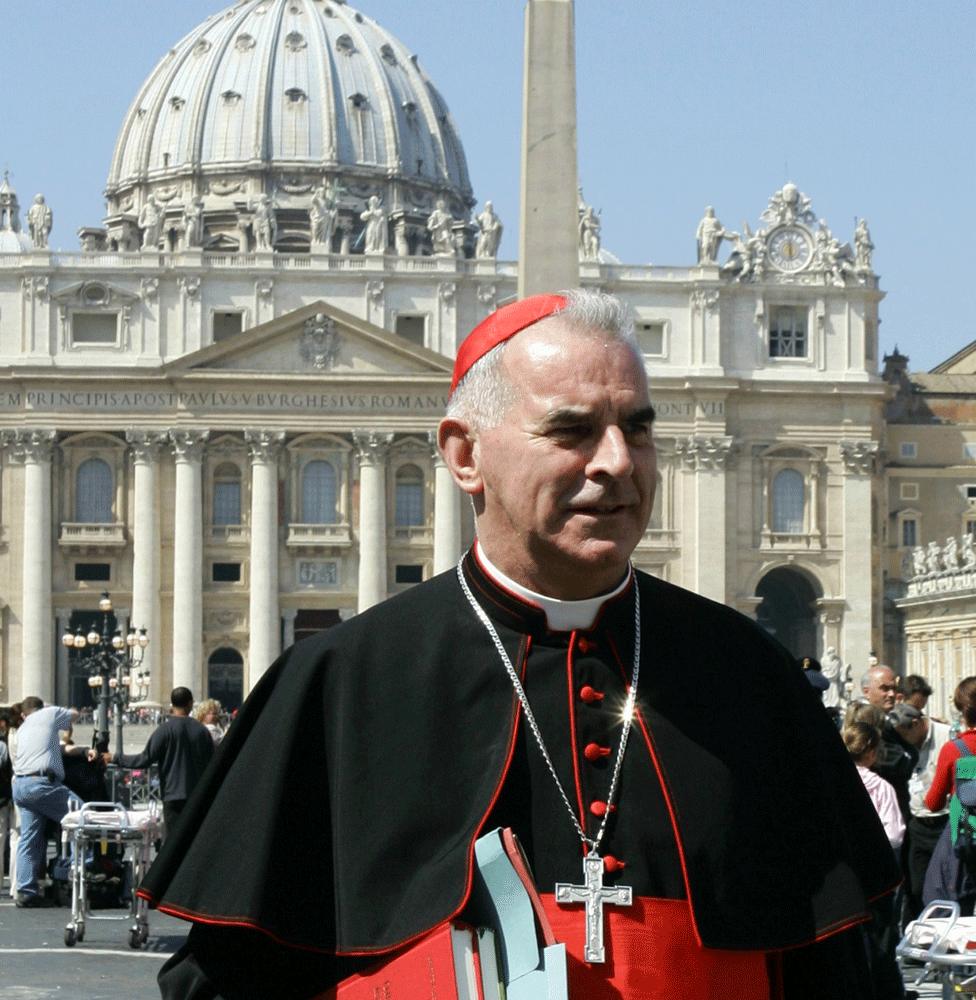
Keith O'Brien took many trips to the Vatican in Rome
Shortly before he resigned as a cardinal and Archbishop of Saint Andrews and Edinburgh, he was interviewed by the BBC's Glenn Campbell.
He laid out, as he had done numerous times before, what he believed was sacrosanct for the church and what might be subject to compromise.
The cardinal said some issues - for example abortion and euthanasia - were "basic dogmatic beliefs" of "divine origin" which the church could never accept.
But he believed it would be within the scope of the Pope to consider whether the Roman Catholic Church should change its stance on issues which were "not of divine origin".
He explained: "For example the celibacy of the clergy, whether priests should marry - Jesus didn't say that.
"There was a time when priests got married, and of course we know at the present time in some branches of the church - in some branches of the Catholic church - priests can get married, so that is obviously not of divine origin and it could get discussed again."
'Divided opinion'
Cardinal O'Brien said he had never personally thought about whether he wanted to get married as he had been "too busy" with his duties.
But he added: "In my time there was no choice and you didn't really consider it too much, it was part of being a priest. When I was a young boy, the priest didn't get married and that was it.
"I would be very happy if others had the opportunity of considering whether or not they could or should get married."
In that same interview he also spoke with excitement of choosing the next Pope.
He held a simple brown card containing the words: "Eligo in Summum Pontificem."
He ran his fingers over the words and told the BBC journalist: "I choose to the supreme Pontiff and then dot, dot, dot, and you choose the name."
But that little brown voting card was never written on and the cardinal's voice fell silent as he departed the public stage for good.
Following the cardinal's death, Archbishop Leo Cushley of St Andrews and Edinburgh nodded to a man of controversy and conviction.
He said: "In life, Cardinal O'Brien may have divided opinion - in death, however, I think all can be united in praying for the repose of his soul, for comfort for his grieving family and that support and solace be given to those whom he offended, hurt and let down. May he rest in peace."
- Published19 March 2018
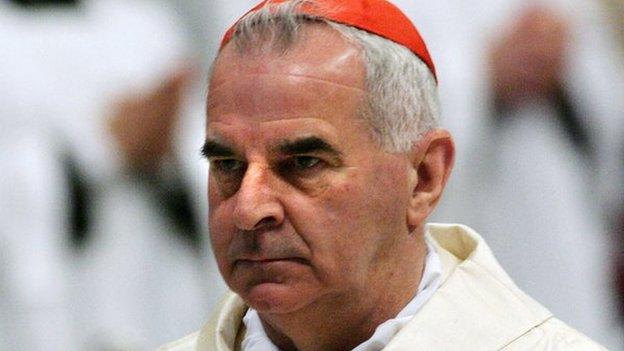
- Published25 February 2013
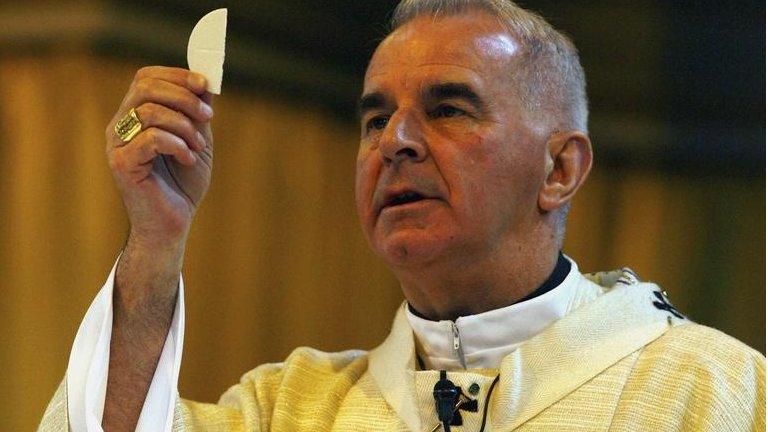
- Published24 February 2013
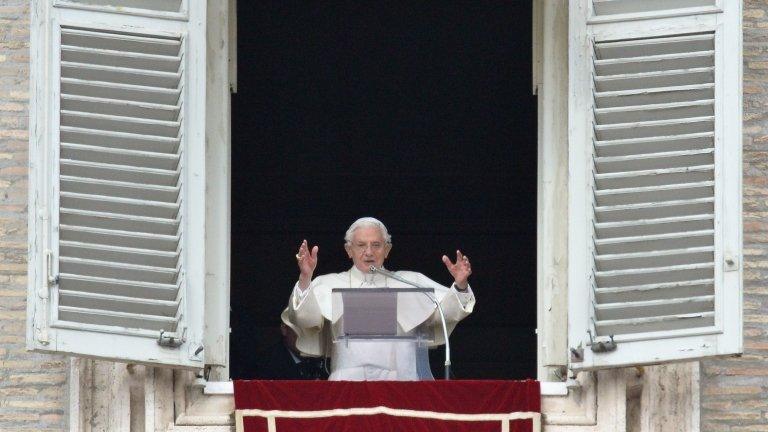
- Published22 February 2013
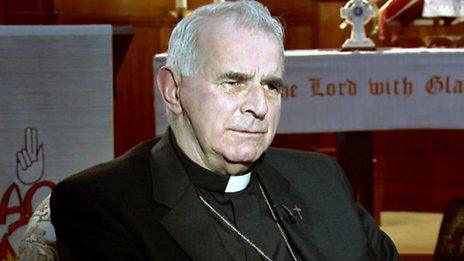
- Published2 November 2012
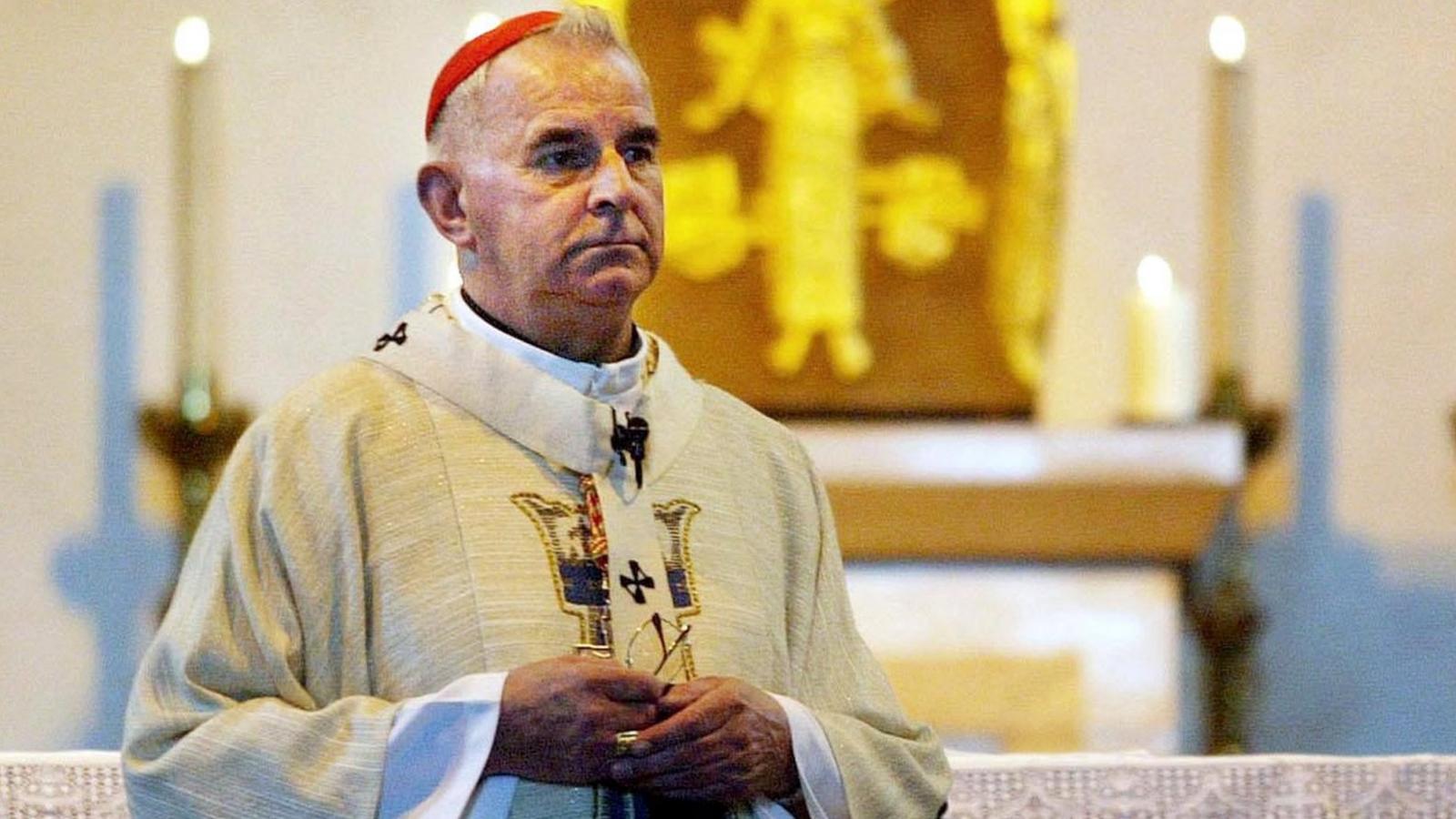
- Published19 August 2012
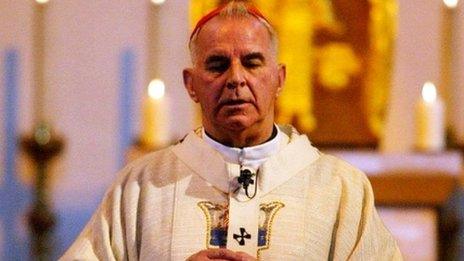
- Published16 July 2012
